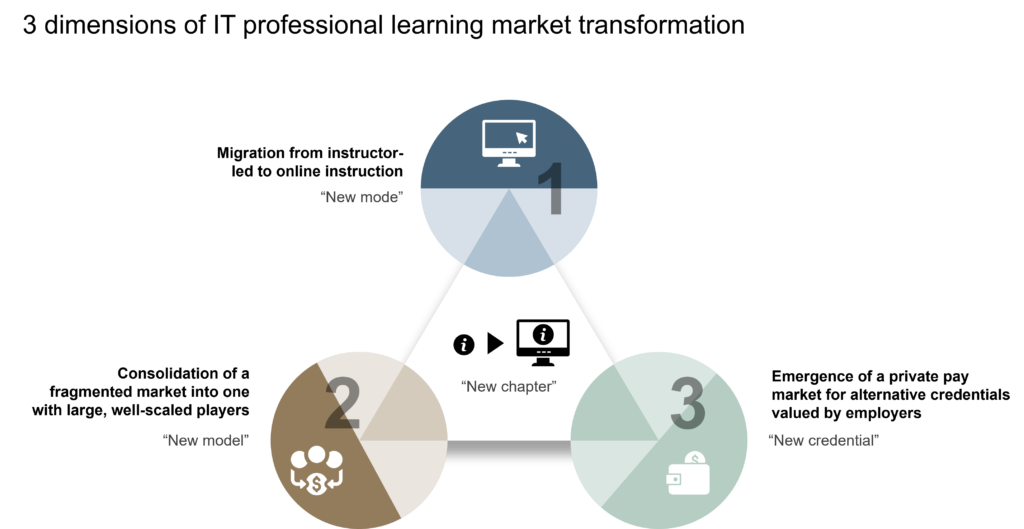Behind the scenes of Otterbein University’s partnership with Antioch University
June 10, 2025 BlogWe’re excited to launch Tyton Partners’ new interview series, Five for the Future: Spotlight on Transformative Institutional Partnerships….
Last month, Simplilearn, the California- and India-based provider of online professional IT-related training to consumers and businesses, raised $45 million from a consortium led by GSV Ventures at an undisclosed valuation, possibly approaching $500 million. The company’s largest shareholder is the Blackstone Group.
Simplilearn partners with universities and businesses to offer boot camps, certificate programs, and IT certification courses. It boasts more than 120,000 paid consumer learners and more than 100,000 enterprise learners. According to Pitchbook sources, the company should generate close to $150 million in 2022 revenue which, if accurate, would place it respectably behind rivals that include Coursera ($496.5M TTM), Udemy ($599.2M TTM), and LinkedIn Learning (revenue undisclosed).
While the capital raise itself is not remarkable (though it likely represents a win for both investors and the company), it does strike us as a quiet milestone in the nearly complete transformation of the IT professional learning market across three dimensions:

To be fair, none of these trends are especially new. The antecedents for Simplilearn are various and it is instructive to reflect on how the market got to where it is today to trust that Simplilearn and its larger competitors are not merely an EdTech fad, but rather a new and lasting category in the learning market.
Those differences began to erode in the 2010s with the advent of video streaming on the Internet. The combination of high-quality video and more recently, robust AI capabilities, together with the efficiency and convenience of online delivery, have largely persuaded buyers that instructional quality need not suffer in online modalities.
The IT market requires constant reskilling, with a focus on skills that are relatively easy to evaluate and certify. In addition, the population of learners must be well disposed to receive instruction via a computer. For these reasons, IT training was an early pioneer in computer-based and eventually, online training, beginning with the founding of CBT Systems in 1984. (CBT Systems rebranded as SmartForce in 1999 and eventually merged with competitor Skillsoft in 2002.) But despite the popularity of some forms of simple digital instruction, instructor-led training lingered as a model for those requiring more in-depth instruction in new technologies and specifically for IT certification training.
Simplilearn’s success is evidence that in-depth boot camp instruction and comprehensive certification training is possible through a fully web-based offering and, more importantly, that this mode of instruction has been fully accepted by the market.
There is no company that better describes the transformation of the legacy IT certification training business model than Pluralsight. Pluralsight was founded in 2004 with $20,000 in seed capital and a business model that involved sending individual instructors to distinct customer locations. But thanks to the advent of high-quality streaming video and the subsequent transformation of its business model, the company has grown dramatically and was acquired by Vista Equity Partners in 2021 at a valuation of $3.5 billion.
While Pluralsight may be the standout in the corporate market, its experience is shared. What had been an inherently low margin, individual instructor- and geography-based IT certification training market has transformed into a well-scaled, investor-friendly, high gross margin business model exemplified by Simplilearn. That said, in-person professional instruction in information technology in areas requiring new skills development remains an important (though much smaller) component of the market today. In fact, Pluralsight purchased DevelopIntelligence in 2020 to bolster its ability to provide instructors at scale to corporations undergoing digital transformation. (Tyton advised DevelopIntelligence in the transaction.)
Of course, MOOCs (like Coursera and edX) brought high-end, partner-branded, IT-related courseware to the “masses” more than 10 years ago. And the ability of self-guided, consumer-purchased instruction to foster entirely new careers was unquestionably cemented by Lynda.com, the predecessor of LinkedIn Learning (which almost single-handedly birthed a new generation of Web designers between 1995 and its acquisition by LinkedIn in 2015). Before there were coding bootcamps and MicroMasters programs, Lynda helped hundreds of thousands of learners train in skills to allow them to pursue an exciting new career path.
Today, the acceptance of short-course, alternative credentials by both consumers and employers as the predicate training for employment is no longer conceptual. The IT sector had already been well-disposed to alternative credentials given the relative ease with which skills can be assessed and certified, but the proliferation of alternative providers in recent years has cemented this market as a strong and even preferred alternative to university-provided credentials in IT fields.
In addition to receiving a new capital infusion last month, Simplilearn also announced its purchase of Fullstack Academy from Zovio for an undisclosed amount (Tyton Partners represented Zovio in the transaction). Fullstack is an online coding bootcamp that also provides white label coding programs for university partners. In making the acquisition, Simplilearn indicated to Indian media that it would help to drive its revenue above US$200M by 2024.
Like certification instruction in the past, coding schools have historically tended to be site-based and fragmented as a result. But the pandemic has accelerated a movement to remote instruction and the ability to effectively teach students to code online is creating scalability that leads to a more profitable business model. This is clearly a core skill set of Simplilearn’s and this new content area should help to create more leverage for its current marketing spend. In addition, we expect Fullstack’s university partners to also benefit from the broader range of program offerings available from Simplilearn’s core business.